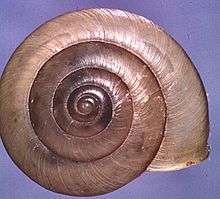Asian trampsnail
| Asian trampsnail | |
|---|---|
| | |
| Shell of Bradybaena similaris | |
| Scientific classification | |
| Kingdom: | Animalia |
| Phylum: | Mollusca |
| Class: | Gastropoda |
| (unranked): | clade Heterobranchia clade Euthyneura |
| Superfamily: | Helicoidea |
| Family: | Bradybaenidae |
| Genus: | Bradybaena |
| Species: | B. similaris |
| Binomial name | |
| Bradybaena similaris (Férussac, 1821)[1] | |
| Synonyms | |
|
Helix similaris Férussac, 1821 | |
Bradybaena similaris, common name the Asian trampsnail, is a species of small, air-breathing land snail, a terrestrial pulmonate gastropod mollusk in the family Bradybaenidae. It earned the common name based on its origins, and its habit of roosting on freight containers . This habit means that this may be one of the most broadly-distributed species of terrestrial snail in the world.
Bradybaena similaris is the type species of the genus Bradybaena.
Distribution
This species is native to Southeast Asia, but it has been accidentally introduced to many areas around the world.
The distribution includes:
The introduced distribution includes states on the Gulf of Mexico, and it is widespread in Florida, USA.[3]
It has become widespread in Eastern Australia, usually living in association with exotic weeds.

Description
The width of the shell is about 12 to 16 mm with 5½ whorls.[3] The color of the shell is light brown, often with a single, apical chestnut band.[3] The shell is sculptured with fine, irregular growth lines and fine spiral striae.[3] The lip of the adult shell is reflected and the columella is partially covering the umbilicus.[3]
Food
Land snails are mainly herbivorous.
Ecology
As an introduced species, the Asian trampsnail is often found in areas with tall grasses and high humidity. Typically this species is found in gardens, greenhouses, and similar habitats, sometimes retreating under logs or fallen branches.[4]
This species is often common with abundant old shells on the ground and among leaf litter, as well as on vegetation and on trees.[3] It is active after rainfall.[3]
Dundee and Cancienne reported that this snail can survive winters in Louisiana where the temperature can fall as low as 5-10°C.[4]
It feeds on a wide variety of plants including citrus[3] and is considered as pest in agriculture.[3] This snail is often exported by accident from Florida to other areas and thus poses a quarantine problem for Florida.[3]
This species of snail creates and uses love darts during mating.Snail eggs generally take 2-4 weeks to hatch, lifespan 2-3 years.
References
This article incorporates public domain text, a public domain work of the United States Government from the reference.[3]
- ↑ Férussac A. E. J. P. J. F. d'Audebard de [1821-1822]. Tableaux systématiques des animaux mollusques classés en familles naturelles, dans lesquels on a établi la concordance de tous les systèmes; suivis d'un prodrome général pour tous les mollusques terrestres ou fluviatiles, vivants ou fossiles. pp. j-xlvij [= 1-47], [1], 1-27, 1-110, [1]. Paris, Londres. (Bertrand, Sowerby).
- ↑ Wu S.-P., Hwang C.-C., Huang H.-M., Chang H.-W., Lin Y.-S. & Lee P.-F. (2007). "Land Molluscan Fauna of the Dongsha Island with Twenty New Recorded Species". Taiwania 52(2): 145-151. PDF.
- 1 2 3 4 5 6 7 8 9 10 11
 Stange L. A. (created September 2004, updated March 2006). "Snails and Slugs of Regulatory Significance to Florida". Division of Plant Industry, Florida Department of Agriculture and Consumer Services. accessed 27 August 2010.
Stange L. A. (created September 2004, updated March 2006). "Snails and Slugs of Regulatory Significance to Florida". Division of Plant Industry, Florida Department of Agriculture and Consumer Services. accessed 27 August 2010. - 1 2 "Asian Trampsnail, Gulf State Marine Fisheries Commission". Retrieved 2007-09-29.
Further reading
- Almeida M. N. & Bessa E. C. A. (2001). "Estudo do crescimento e da reprodução de Bradybaena similaris (Mollusca, Xanthonychidae) em laboratório. [Growth and reproduction of Bradybaena similaris (Férussac) (Mollusca, Xanthonychidae) in laboratory conditions]". Revista Brasileira de Zoologia 18(4): 1115-1122. doi:10.1590/S0101-81752001000400010. PDF.
External links
- Bradybaena similaris on the UF / IFAS Featured Creatures Web site
| Wikimedia Commons has media related to Bradybaena similaris. |
